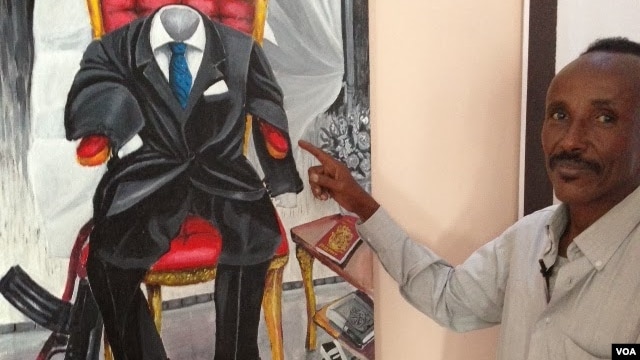FILE – Somali artist Affey with his painting ‘Empty Suit’, representing diaspora politicians.
TEXT SIZE
Gabe Joselow
October 15, 2013
MOGADISHU — There is great hope and optimism in the Somali capital, Mogadishu, for those residents who lived through years of war.
In a gallery at the Center for Research and Dialogue in Mogadishu, Somali artist Adan Farah Affey stands in front of one of his paintings. It is called “Empty Suit” and depicts a business suit without a body that he says represents politicians from the diaspora.
“The first politicians that came to the country… the ones who got into politics, not business, were those that experienced hard times abroad and came here wanting to make quick money,” said Affey.
Affey has lived in Mogadishu his entire life. He took his painting underground during more than 20 years of conflict.
Now that the city is experiencing a relative period of peace following the removal of al-Shabab militants in 2011, he finally has the chance to express himself more openly and has been observing the return of the Somali diaspora seeking opportunity in Mogadishu.
He says despite some of the negative impact, returning Somalis have also done some good.
“Apart from the money they bring in,” he said, “they have brought creativity from different parts of the world, they will change many things in this country. So many different businesses are being created.”
While many members of the Somali diaspora see Mogadishu as a blank canvas for business and innovation, local Somalis have a different experience of the city that has been shaped by years of war.
Jamal Abdirahman is a youth activist in the capital and a life-long Mogadishu resident.
“Many people died without reason, and that created many problems, like some people lost their loved ones, some people lost their hope and some people fled from their country to become refugees in other countries. And now we see hope in the near future,” said Abdirahman.
But the city has also changed. After years of rule by an administration of Islamic courts, and the subsequent takeover by the Islamist al-Shabab militants, Mogadishu has become a very conservative town.
The culture clash with “westernized” Somalis remains a source of tension.
Khadija Ali, who has just returned to Mogadishu after 27 years in Canada, finds it a very different city from what she used to know. More women wear headscarves and full burkas, a change from the more liberal era of the 1970s and 1980s.
“People are more religious now, people are more conservative than it was before. And I can understand, in my culture as a religion, when we encounter difficulties, we go to God,” said Ali.
Despite the culture shock, Ali, who worked as a doctor in Toronto, hopes to get involved in improving health services in Mogadishu.
Like many in the capital, she has big plans to help rebuild a city and a country still fragile from years of conflict.
In a gallery at the Center for Research and Dialogue in Mogadishu, Somali artist Adan Farah Affey stands in front of one of his paintings. It is called “Empty Suit” and depicts a business suit without a body that he says represents politicians from the diaspora.
“The first politicians that came to the country… the ones who got into politics, not business, were those that experienced hard times abroad and came here wanting to make quick money,” said Affey.
Affey has lived in Mogadishu his entire life. He took his painting underground during more than 20 years of conflict.
Now that the city is experiencing a relative period of peace following the removal of al-Shabab militants in 2011, he finally has the chance to express himself more openly and has been observing the return of the Somali diaspora seeking opportunity in Mogadishu.
He says despite some of the negative impact, returning Somalis have also done some good.
“Apart from the money they bring in,” he said, “they have brought creativity from different parts of the world, they will change many things in this country. So many different businesses are being created.”
While many members of the Somali diaspora see Mogadishu as a blank canvas for business and innovation, local Somalis have a different experience of the city that has been shaped by years of war.
Jamal Abdirahman is a youth activist in the capital and a life-long Mogadishu resident.
“Many people died without reason, and that created many problems, like some people lost their loved ones, some people lost their hope and some people fled from their country to become refugees in other countries. And now we see hope in the near future,” said Abdirahman.
But the city has also changed. After years of rule by an administration of Islamic courts, and the subsequent takeover by the Islamist al-Shabab militants, Mogadishu has become a very conservative town.
The culture clash with “westernized” Somalis remains a source of tension.
Khadija Ali, who has just returned to Mogadishu after 27 years in Canada, finds it a very different city from what she used to know. More women wear headscarves and full burkas, a change from the more liberal era of the 1970s and 1980s.
“People are more religious now, people are more conservative than it was before. And I can understand, in my culture as a religion, when we encounter difficulties, we go to God,” said Ali.
Despite the culture shock, Ali, who worked as a doctor in Toronto, hopes to get involved in improving health services in Mogadishu.
Like many in the capital, she has big plans to help rebuild a city and a country still fragile from years of conflict.















